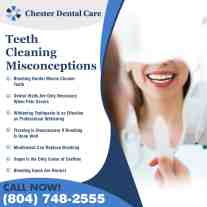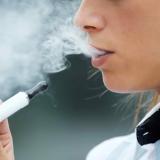Many people in Chester, Virginia, search for teeth cleaning nearby, believing they are maintaining good oral health with daily brushing and flossing. However, misinformation about proper dental care leads to habits that cause cavities, gum disease, and enamel erosion. Some think brushing harder cleans teeth better, while others assume professional cleanings are unnecessary. These misconceptions put dental health at risk and often result in costly treatments.
At Chester Dental Care, we prioritize patient education. Many adults skip routine cleanings, believing at-home care is enough, but research shows that professional cleanings can reduce the risk of gum disease by 50%. Others avoid visits due to concerns about discomfort or cost, not realizing that untreated dental issues can lead to more expensive treatments. In this article, we clear up common misconceptions, share factual insights, and explain why scheduling a teeth cleaning near you is vital for long-term oral health.
Key Takeaways
Brushing harder does not clean teeth better. Gentle brushing with a soft-bristled toothbrush is more effective and prevents enamel damage and gum recession.
Professional teeth cleaning is necessary even if you brush and floss daily. Regular cleanings remove hardened plaque (tartar) that at-home care cannot, reducing the risk of gum disease.
Whitening toothpaste does not clean teeth better. It only removes surface stains and can be abrasive, potentially damaging enamel over time.
Skipping professional cleanings can be more expensive in the long run. However, investing in preventive care costs far less than treating advanced cavities or gum disease, making it a financially savvy choice for your dental health.
Natural remedies cannot replace professional dental cleanings. While some may freshen your breath, they do not remove tartar or detect early oral health issues.
Myth: Brushing Harder Cleans Teeth Better
Brushing too hard damages the enamel and irritates the gums. Using a soft-bristled toothbrush with gentle, circular motions is the best way to clean teeth effectively. Hard brushing can wear down the enamel, leading to sensitivity and a higher risk of cavities.
Why Gentle Brushing Works
Soft bristles remove plaque without damaging enamel.
Circular motions clean teeth thoroughly without irritating gums.
Brushing for two minutes twice daily is more effective than forceful scrubbing.
Illustrative Example: Lisa thought scrubbing harder would make her teeth whiter. Instead, she developed gum recession and sensitivity. Switching to a soft-bristled brush improved her oral health within months.

Myth: Professional Cleanings Are Unnecessary If You Brush and Floss Daily
Regular cleanings remove tartar and detect issues early. Even with good hygiene, plaque hardens into tartar, which can only be removed by a dentist. Routine cleanings help prevent gum disease and identify early signs of decay.
Why Professional Cleanings Matter
Tartar buildup leads to cavities and gum disease.
Dentists spot early signs of oral health problems.
Fluoride treatments strengthen enamel and prevent decay.
A study by the American Dental Association (ADA) found that patients who get professional cleanings at least twice a year reduce their risk of gum disease by 50%.
Illustrative Example: Mark brushed twice daily but skipped dental cleanings. Over time, tartar buildup led to gum inflammation. A professional cleaning removed the buildup and prevented further damage, saving him from potentially costly treatments.
Myth: Whitening Toothpaste Cleans Teeth Better
Whitening toothpaste removes surface stains but does not clean more effectively than regular fluoride toothpaste. Some whitening toothpastes contain abrasives that can wear down enamel over time.
Best Toothpaste for Cleaning
Fluoride toothpaste prevents cavities and strengthens enamel.
Non-abrasive formulas protect enamel while cleaning teeth.
Whitening toothpastes are safe when used as directed but should not replace regular dental care.
Illustrative Example: Sarah used whitening toothpaste daily but still had plaque buildup. A switch to fluoride toothpaste improved her oral health, and a professional cleaning brightened her smile more than any toothpaste could.
Myth: Dental Cleanings Weaken Teeth
Teeth Cleanings help protect teeth by removing harmful plaque and tartar. Some people believe that scraping during cleanings weakens the enamel, but this is false. Removing plaque prevents cavities and gum disease, helping maintain strong, healthy teeth.
Why Cleanings Strengthen Teeth
Removes bacteria that cause decay and gum disease.
Fluoride treatments strengthen enamel.
Early detection of issues prevents more extensive treatments.
A study by the CDC found that untreated gum disease affects about 62% of adults over 30 and can lead to tooth loss if not managed.
Myth: Teeth Cleaning Is Painful
Modern dental cleanings are designed to be comfortable. While some people experience minor sensitivity, professional cleanings should not be painful. Dentists use gentle techniques and numbing options for sensitive patients.
What to Expect During a Cleaning
Plaque and tartar removal using specialized tools.
Polishing to remove surface stains.
Fluoride application to strengthen enamel.
Illustrative Example: James avoided cleanings due to fear of pain. After his first visit, he was surprised by how gentle the process was. Regular cleanings improved his gum health without discomfort.
Myth: Dental Cleanings Are Expensive
The average cost of teeth cleaning is lower than the cost of treating dental problems. Preventive care saves money in the long run by reducing the need for costly procedures like fillings, crowns, and gum treatments.
Teeth Cleaning Costs vs. Treatment Costs
Average cost of teeth cleaning: $75–$200.
Filling a cavity: $50–$4500.
Root canal treatment: $500–$1,500.
Illustrative Example: Jenna skipped her dental cleanings for years. When she finally visited a dentist, she needed multiple fillings, costing over $1,000. Regular cleanings would have saved her money and prevented decay.
Myth: You Only Need a Cleaning If Your Teeth Hurt
Dental problems can develop without pain. Many issues, including cavities and gum disease, do not cause noticeable symptoms until they become severe. Routine cleanings help detect problems early.
Preventive Care Benefits
Catches cavities before they require major treatment.
Prevents gum disease from advancing.
Maintains fresh breath and healthy gums.
A survey by the National Institute of Dental and Craniofacial Research found that 26% of adults have untreated tooth decay.
Illustrative Example: David never had tooth pain, so he avoided the dentist. When he finally went, he needed a root canal for a silent cavity that had reached the nerve.
Myth: Mouthwash Can Replace Brushing
Mouthwash freshens breath and helps reduce bacteria, but it does not remove plaque. Brushing and flossing are necessary to prevent cavities and gum disease. Mouthwash should be used as an additional step in oral hygiene, not a substitute for brushing.
Why Brushing and Flossing Are Important
Removes food particles and plaque that mouthwash cannot.
Prevents cavities and gum disease.
Strengthens teeth when used with fluoride toothpaste.
Illustrative Example: Alex relied on mouthwash instead of brushing at night. Over time, plaque buildup led to cavities and gum inflammation. After resuming regular brushing and flossing, his dental health improved.
Myth: Sugar Is the Only Cause of Cavities
While sugar plays a role in tooth decay, other factors contribute to cavities. Acidic foods, poor oral hygiene, and infrequent dental cleanings also lead to enamel damage. Regular dental visits help remove plaque and detect early signs of decay before serious issues develop.
What Contributes to Cavities
Acidic foods weaken enamel, making teeth more prone to decay.
Plaque buildup from infrequent brushing leads to bacteria growth.
Lack of fluoride reduces enamel strength.
Illustrative Example: Rachel avoided sugary foods but still got cavities. Her dentist explained that her diet of acidic foods and irregular brushing contributed to enamel erosion. Regular cleanings helped reverse early decay.
Myth: Bleeding Gums Are Normal
Gums that bleed when brushing or flossing are often a sign of gingivitis, the early stage of gum disease. Healthy gums should not bleed. Regular cleanings and good oral hygiene help prevent gum inflammation and reduce the risk of advanced gum disease.
Why Healthy Gums Shouldn't Bleed
Bleeding is a sign of irritation or infection.
Proper brushing and flossing improve gum health.
Professional cleanings help remove plaque buildup that causes gum inflammation.
Illustrative Example: David thought bleeding gums were normal, but his dentist diagnosed him with early gum disease. After consistent cleanings and better flossing habits, his gum health improved.
FAQs on Teeth Cleaning Myths
1. Does brushing harder clean teeth better?
No, brushing too hard can wear down enamel and irritate gums. Using a soft-bristled toothbrush with gentle, circular motions removes plaque without causing damage. Regular teeth cleaning at our clinic helps keep your smile healthy.
2. Is professional teeth cleaning necessary if I brush and floss daily?
Yes, even with good oral hygiene, tartar builds up and can only be removed with professional teeth cleaning. Skipping cleanings increases the risk of cavities and gum disease. Our team helps prevent these issues with routine cleanings.
3. Does whitening toothpaste clean teeth better than regular toothpaste?
No, whitening toothpastes only remove surface stains and don’t clean better than fluoride toothpaste. Some are abrasive and can wear down enamel over time. A professional teeth cleaning at our office helps maintain both oral health and a bright smile.
4. Can teeth cleaning make teeth weaker?
No, professional teeth cleaning removes harmful plaque and tartar, strengthens teeth, and prevents gum disease. We also provide fluoride treatments to help protect and reinforce enamel.
5. Is teeth cleaning painful?
No, professional teeth cleaning should not be painful. Some people may feel minor sensitivity, but we use gentle techniques to keep the experience as comfortable as possible. Regular cleanings help maintain a healthy smile without discomfort.

The Truth About Teeth Cleaning: Chester Dental Care Can Help
Regular cleanings keep teeth healthy and prevent costly dental problems. At Chester Dental Care, we provide professional cleanings in a comfortable setting to help patients maintain strong, healthy smiles.
Why Choose Chester Dental Care?
Experienced team with a focus on airway and sleep dentistry.
Low staff turnover for consistent, personalized care.
Advanced technology for thorough and gentle cleanings.
Schedule Your Teeth Cleaning Today
Keeping up with professional teeth cleanings helps protect your smile for years to come. Contact Chester Dental Care to book an appointment. Call us at (804) 748-2555 or email frontdesk@chesterdentalcareva.com.



